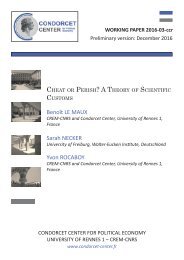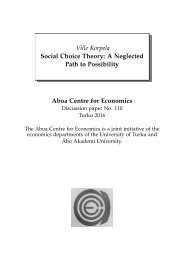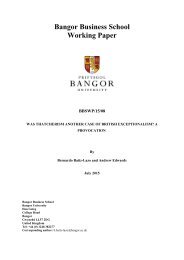MEMORANDUM
n?u=RePEc:hhs:osloec:2016_018&r=hpe
n?u=RePEc:hhs:osloec:2016_018&r=hpe
Create successful ePaper yourself
Turn your PDF publications into a flip-book with our unique Google optimized e-Paper software.
very soon, before the end of April. But if he got it, he would still be in a fix on his return to<br />
Germany after one year.<br />
Adolf Löwe had been appointed professor at Frankfurt University and would leave in<br />
the autumn. He had suggested to Leontief that he could do his habilitation in Frankfurt<br />
with Zizek who was professor Frankfurt University. Leontief didn’t know what to think<br />
about this proposal. It seemed to him that the habilitation question was the most important<br />
just now for his future possibilities. Again he requested Schumpeter’s opinion. 147<br />
Later in April 1931 there were new developments on the applications to visit USA.<br />
Leontief had adhered to Ezekiel’s advice but Brookings had insisted on an immediate<br />
answer. Luckily, a letter from NBER arrived on the same day with the message that<br />
Leontief had been appointed as a research associate in NBER. The Brookings fellowship<br />
was no longer of interest.<br />
Leontief had been appointed as number one of the three NBER research associates for<br />
1931/32. According to the NBER Annual Report 1931 there had been a large number of<br />
well-qualified applicants. 148 Leontief was described as a student of the conditions of<br />
demand and supply in selected commodity markets and his project as an “attempt toward<br />
an analysis of the mechanism of economic, especially cyclical, changes.”<br />
Leontief wrote immediately to Schumpeter in Bonn that he had been appointed<br />
research associate of NBER and had to take up the position by 1 October. Schumpeter<br />
responded immediately to Leontief to congratulate him with the appointment. But more<br />
important he wrote to say that whether he returned to Germany after one year or would try<br />
to make a career in America, it would be of the greatest importance that he could do the<br />
habilitation during the summer semester before he left for America. Schumpeter had no<br />
doubt that Leontief’s published papers plus the Eisenaufsatz would be more than sufficient.<br />
Although time was short Schumpeter figured it could be done with the help of Löwe and<br />
the two professors in Frankfurt, Zizak and Pribram. 149 In his view, Leontief should<br />
absolutely go for it: “You may discuss my advice with Löwe and Lederer. I am very<br />
curious about your new work. I hope I shall see before you leave.” 150 Leontief answered<br />
immediately that habilitation before departure would undoubtedly have been the best but<br />
time had run out for it. Löwe would not be in Frankfurt until the winter semester. Leontief<br />
147 Leontief to Schumpeter, 3 April 1931.<br />
148 The other two appointed research associates were Carl T. Schmidt and A. G. Silverman.<br />
149 Karl E. Pribram (1877-1973) was Austrian, had been professor at Vienna University, and<br />
worked for ILO in the 1920s. He was professor in Frankfurt am Main from 1928 and lost his chair<br />
in 1933 because of his Jewish extraction. Emigrated to USA in 1934. Member of the Econometric<br />
Society.<br />
150 Schumpeter to Leontief, 20 April 1931, transl. by ob.<br />
63





